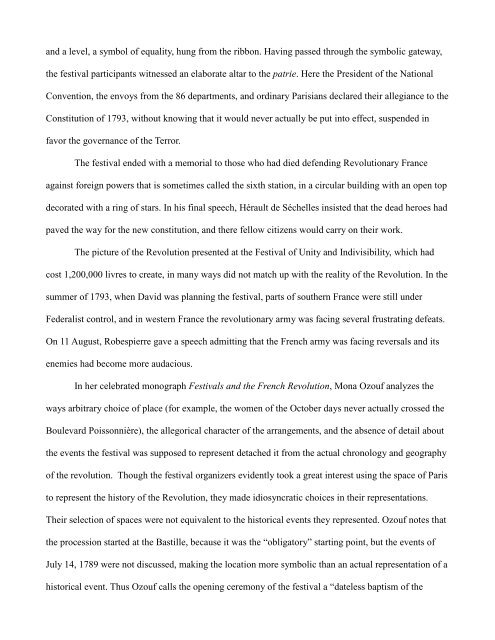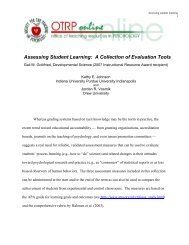Jacques-Louis David and the Festival of Unity ... - Xavier University
Jacques-Louis David and the Festival of Unity ... - Xavier University
Jacques-Louis David and the Festival of Unity ... - Xavier University
Create successful ePaper yourself
Turn your PDF publications into a flip-book with our unique Google optimized e-Paper software.
<strong>and</strong> a level, a symbol <strong>of</strong> equality, hung from <strong>the</strong> ribbon. Having passed through <strong>the</strong> symbolic gateway,<br />
<strong>the</strong> festival participants witnessed an elaborate altar to <strong>the</strong> patrie. Here <strong>the</strong> President <strong>of</strong> <strong>the</strong> National<br />
Convention, <strong>the</strong> envoys from <strong>the</strong> 86 departments, <strong>and</strong> ordinary Parisians declared <strong>the</strong>ir allegiance to <strong>the</strong><br />
Constitution <strong>of</strong> 1793, without knowing that it would never actually be put into effect, suspended in<br />
favor <strong>the</strong> governance <strong>of</strong> <strong>the</strong> Terror.<br />
The festival ended with a memorial to those who had died defending Revolutionary France<br />
against foreign powers that is sometimes called <strong>the</strong> sixth station, in a circular building with an open top<br />
decorated with a ring <strong>of</strong> stars. In his final speech, Hérault de Séchelles insisted that <strong>the</strong> dead heroes had<br />
paved <strong>the</strong> way for <strong>the</strong> new constitution, <strong>and</strong> <strong>the</strong>re fellow citizens would carry on <strong>the</strong>ir work.<br />
The picture <strong>of</strong> <strong>the</strong> Revolution presented at <strong>the</strong> <strong>Festival</strong> <strong>of</strong> <strong>Unity</strong> <strong>and</strong> Indivisibility, which had<br />
cost 1,200,000 livres to create, in many ways did not match up with <strong>the</strong> reality <strong>of</strong> <strong>the</strong> Revolution. In <strong>the</strong><br />
summer <strong>of</strong> 1793, when <strong>David</strong> was planning <strong>the</strong> festival, parts <strong>of</strong> sou<strong>the</strong>rn France were still under<br />
Federalist control, <strong>and</strong> in western France <strong>the</strong> revolutionary army was facing several frustrating defeats.<br />
On 11 August, Robespierre gave a speech admitting that <strong>the</strong> French army was facing reversals <strong>and</strong> its<br />
enemies had become more audacious.<br />
In her celebrated monograph <strong>Festival</strong>s <strong>and</strong> <strong>the</strong> French Revolution, Mona Ozouf analyzes <strong>the</strong><br />
ways arbitrary choice <strong>of</strong> place (for example, <strong>the</strong> women <strong>of</strong> <strong>the</strong> October days never actually crossed <strong>the</strong><br />
Boulevard Poissonnière), <strong>the</strong> allegorical character <strong>of</strong> <strong>the</strong> arrangements, <strong>and</strong> <strong>the</strong> absence <strong>of</strong> detail about<br />
<strong>the</strong> events <strong>the</strong> festival was supposed to represent detached it from <strong>the</strong> actual chronology <strong>and</strong> geography<br />
<strong>of</strong> <strong>the</strong> revolution. Though <strong>the</strong> festival organizers evidently took a great interest using <strong>the</strong> space <strong>of</strong> Paris<br />
to represent <strong>the</strong> history <strong>of</strong> <strong>the</strong> Revolution, <strong>the</strong>y made idiosyncratic choices in <strong>the</strong>ir representations.<br />
Their selection <strong>of</strong> spaces were not equivalent to <strong>the</strong> historical events <strong>the</strong>y represented. Ozouf notes that<br />
<strong>the</strong> procession started at <strong>the</strong> Bastille, because it was <strong>the</strong> “obligatory” starting point, but <strong>the</strong> events <strong>of</strong><br />
July 14, 1789 were not discussed, making <strong>the</strong> location more symbolic than an actual representation <strong>of</strong> a<br />
historical event. Thus Ozouf calls <strong>the</strong> opening ceremony <strong>of</strong> <strong>the</strong> festival a “dateless baptism <strong>of</strong> <strong>the</strong>

















